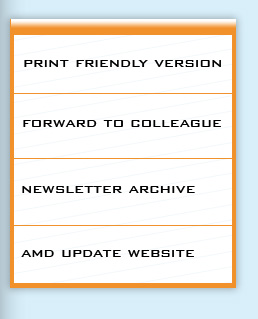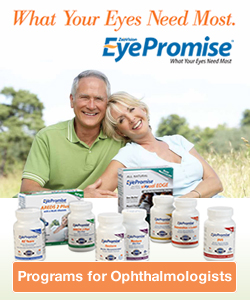

|
July 2010, Issue 43
Combination Treatment with Epimacular Brachytherapy and Anti-VEGF Therapy for Age-Related Macular Degeneration
Pravin Dugel, MD
Currently, the most widely used treatments for neovascular AMD are the anti-vascular endothelial growth factor (anti-VEGF) agents ranibizumab and bevacizumab. They have gained rapid acceptance in the retina community because of their favorable efficacy and acceptable safety profiles.3 Unfortunately, the vision benefits achieved with these two drugs are lost when their monthly injection treatment regimen is not followed.4 In an effort to reduce the treatment burden on patients, physicians, and health care systems, several combination treatment options are being evaluated. An innovative technology commonly referred to as epimacular brachytherapy is currently under investigation in a phase III randomized, controlled, multicenter, international clinical study (CABERNET). The CABERNET study is fully enrolled (n=450) and the one-year results are expected in late 2010. Epimacular brachytherapy is also under investigation in a pilot study evaluating the safety and efficacy of the therapy in patients who require frequent, chronic treatment with anti-VEGF agents. The MERITAGE study [“A Study of the NeoVista Ophthalmic System for the Treatment of Subfoveal CNV Associated With Wet AMD in Patients That Require Persistent Anti-VEGF Therapy (MERITAGE)] (Clinicaltrials.gov identifier: NCT00809419) enrolled only patients with active, exudative AMD that persisted despite continuous, frequent anti-VEGF treatment (n=50), in an attempt to reduce the overall treatment burden in this patient population. Preliminary observations (n=16) suggest that a single procedure of epimacular brachytherapy reduced patients’ need for ongoing anti-VEGF therapy. Importantly, 63% of patients showed some improvement in visual acuity, with 50% gaining at least five letters or more at six months. A 50% reduction in the re-injection rate was noted as compared to the injection rates six months prior to receiving epimacular brachytherapy. The 1-year follow up results from these patients should be available in late 2010.5,6 A considerable concern to various government healthcare systems worldwide is the cost of AMD treatment, especially given the increasingly older population. Costs of treating neovascular AMD with ranibizumab hover around $55,000 for two years of anti-VEGF injections per patient.7 Recent studies have indicated epimacular brachytherapy in combination with anti-VEGF drugs is more cost effective than anti-VEGF alone.8-10 If the results from CABERNET and MERITAGE continue to support the earlier outcomes, combination treatment of epimacular brachytherapy with anti-VEGF medication may have the potential for a positive global impact on treatment burden and healthcare costs associated with the management of neovascular AMD. REFERENCES
|
Ingrid U. Scott, MD, MPH, Editor
Professor of Ophthalmology and
|

|



